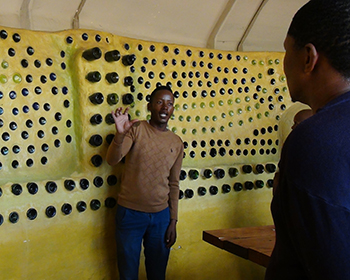Latest News Archive
Please select Category, Year, and then Month to display items
15 March 2022
|
Story Rulanzen Martin
|
Photo Supplied
 The keynote speakers are Dr Khabele Motlosa (right), Senior Lecturer in the Department of Political and Administrative Studies at NUL, and leading Pan-Africanist scholar Prof Molefi Kete Asante(left).
The keynote speakers are Dr Khabele Motlosa (right), Senior Lecturer in the Department of Political and Administrative Studies at NUL, and leading Pan-Africanist scholar Prof Molefi Kete Asante(left).
The
Centre for Gender and Africa Studies (CGAS) at the University of the Free State (UFS), together with the
National University of Lesotho (NUL) and the Academic Forum for Development of Lesotho, is hosting an online think tank on the transnational communities of the Lesotho-South Africa border from 19 to 21 March 2021. The theme of the conference is
Lesotho and South Africa: a clarion call for a Pan-Africanist future.
Dr Munyaradzi Mushonga, Programme Director: Africa Studies Programme in CGAS, is the convenor of the conference and is also leading the UFS borderlands panel. The borderlands project is jointly funded by the Office of the Dean: Faculty of the Humanities at the UFS, and the National Institute for the Humanities and Social Sciences (NIHSS).
For more information and to register for the conference, click here

Eco-building workshop and rehabilitation through collaboration
2017-03-17

A demonstration of eco-building at Lebone Village
recreation centre
Photo: Supplied
An intimate learning platform was created when Velile Phantsi and Mokoena Maphalane, two community members who had received training in eco-building from the University of the Free State (UFS) Centre for Development Support (CDS) under the Faculty of Economic and Management Sciences, presented a workshop for 10 Free State psychiatric patients in Bloemfontein on 23 February 2017.
Building self-sustaining communities
The training programme took place at Lebone Village recreation centre, at a structure that was built through the eco-building initiative, Qala Phelang Tala (Start Living Green). The collaboration between the Department of Occupational Therapy at the Faculty of Health Sciences and CDS has the potential to address unemployment and housing backlogs and forms a significant part of the rehabilitation of vulnerable people. It has also created prospects for community-based research.
Training and support to rehabilitate vulnerable people
Following the sharing of skills, the Department of Occupational Therapy will continue to work with patients through this community engagement project. Trainees will receive support in building a recreation centre structure at their own complex. During the presentation Mokoena Maphalane shared his personal experience of how physical activity such as eco-building helped him recover from the debilitating effects of a stroke. It is something he hopes will assist other patients in the future.
More information on eco-building.